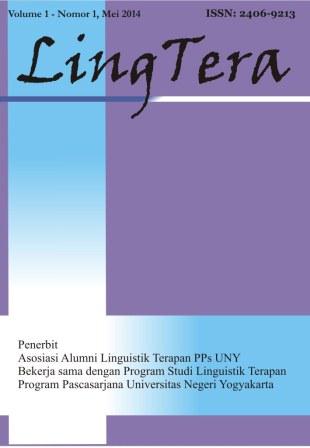Penerjemahan aspek budaya dalam Para Priyayi ke ein Hauch von Macht
DOI:
https://doi.org/10.21831/lt.v4i1.13634Keywords:
aspek budaya, ideologi penerjemahan, teknik penerjemahan, teks sumber (TSu), teks sasaran (TSa), cultural aspects, ideology of translation, technique of translation, source text (ST), target text (TT)Abstract
Penelitian ini bertujuan untuk menganalisis penerjemahan aspek budaya dalam Para Priyayi ke Ein Hauch von Macht, serta ideologi dan teknik penerjemahan yang digunakan. Penelitian ini menggunakan metode deskriptif kualitatif. Data penelitian ini adalah satuan lingual yang mengandung unsur budaya. Dari hasil penelitian didapatkan 457 data yang diklasifikasikan dalam sembilan aspek budaya yaitu aspek material (122 data), agama (51 data), kekerabatan (109 data), ekonomi (28 data), gestur dan kebiasaan (61 data), estetik dan rekreasi (39 data), politik (28 data), ekologi (14 data), dan pendidikan (4 data). Ideologi yang digunakan adalah foreignisation dan domestication yang digunakan bersama-sama, sehingga TSa memiliki tingkat keterbacaan yang tinggi dan pembaca TSa dapat memahami makna teks serta mendapatkan pengalaman yang sama dengan pembaca TSu.Teknik penerjemahan yang digunakan adalah teknik borrowing (116 data), calque (1 data), literal (199 data) modulasi (3 data), ekuivalensi (7 data), adaptasi (4 data), deskripsi (36 data), reduksi (16 data), dan couplets (74 data).
The translation of cultural aspects in Para Priyayi into ein Hauch von Macht
Abstract
The aims of this study are to analyze the cultural aspects in Para Priyayi and its translation Ein Hauch von Macht, the ideologies of translation and the translation techniques used to translate the texts. This research was descriptive qualitative. The data were linguistic units containing cultural elements. There are 457 data found in this research, and they are classified into nine cultural aspects, namely material (122 data), religion (51 data), kinship (109 data), economy (28 data), gesture and custom (61 data), aesthetic dan recreation (39 data), politics (28 data), ecology (14 data), and education (4 data).The ideologies used are foreignization and domestication which were used simultaneously, so the TT has a high readability that readers can understand the meaning and get the same experience as the ST readers. The translation techniques used are borrowing (116 data), calque (1 data), literal (199 data), transposition (1 data), modulation (3 data), equivalency (7 data), adaptation (4 data), description (36 data), reduction (16 data), and couplets (74 data).
References
Geerzt, H. (1983). Keluarga Jawa. (Terjemahan Hersri). Amerika Serikat: The Free Press of Glenncoe, Inc. (Buku asli diterbitkan tahun 1961).
Hatim, B. & Munday, J. (2004). Translation: an advanced reference book. London: Routlegde.
Kayam, U. (2009). Para priyayi. Cetakan XIII. Jakarta: Pustaka Utama Grafiti.
Koentjaraningrat. (1974). Kebudayaan, mentalitet dan pembangunan. Jakarta: PT Gramedia Pustaka Utama.
Machali, R. (2012). Cases of domestication dan foreignization in the translation of Indonesian poetry into English: A preliminary inquiry. Journal of Language and Culture, 3 (4): 74-82.
Mansour, H.M. (2014). Domestication and foreignization in translating culture-specific references of an English text into Arabic. International Journal of English Language and Translation Studies, 2 (2): 23-26.
Newmark, P. (1987). A text book of translation. London: Prentice Hall.
Sternagel, P. (1999). Ein Hauch von Macht. Rhein: Horlemann Verlag.Downloads
Published
How to Cite
Issue
Section
Citation Check
License
LingTera allows readers to read, download, copy, distribute, print, search, or link to its articles' full texts and allows readers to use them for any other lawful purpose. The journal allows the author(s) to hold the copyright without restrictions. Finally, the journal allows the author(s) to retain publishing rights without restrictions.
- Authors are allowed to archive their submitted articles in an open-access repository.
- Authors are allowed to archive the final published article in an open-access repository with an acknowledgment of its initial publication in this journal.

Psychology, Evaluation, and Technology in Educational Research is licensed under a Creative Commons Attribution-ShareAlike 4.0 International License.
Based on a work at https://petier.org/index.php/PETIER.










